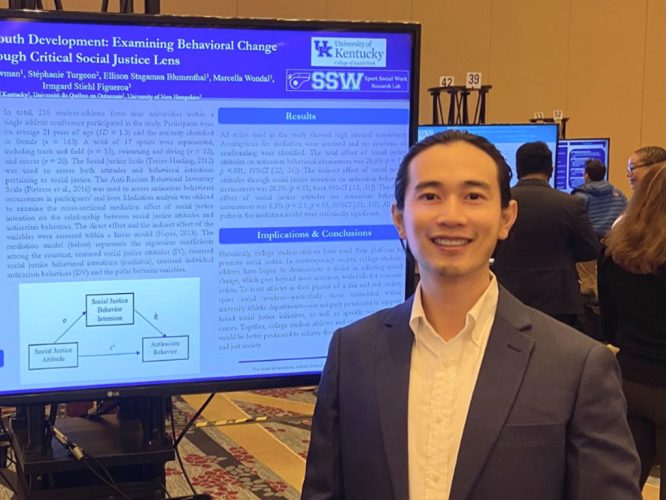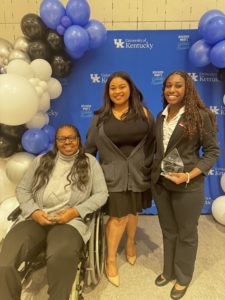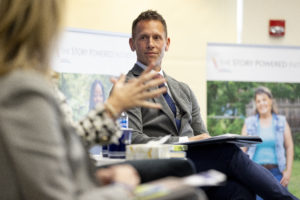LEXINGTON, Ky. – University of Kentucky College of Social Work Ph.D. student, Levone Lee, published his first lead-author article, titled “Attitudes Toward Aggressive and Violent Behaviors and the Role of Life Skills Among University Club Sport Athletes.” This article examines the relationship between life skills developed in sport context and attitudes toward aggressive and violent behaviors outside of sports.
Dr. Tarkington Newman, CoSW Associate Professor and Director of the Sport Social Work Lab, and Stéphanie Turgeon, professor at Université du Québec en Outaouais, were co-authors on this publication, exploring skills developed in sport like emotional regulation, social interaction, teamwork, leadership, problem-solving, and time management.
“The findings in this article indicated that for university club sport athletes, life skills developed in sport context in general are linked to socially favorable attitudes toward aggressive and violent behaviors,” Lee said. “When athletes develop skills like emotional control, teamwork, and problem-solving within the sports setting, they are more likely to adopt attitudes that reject or minimize aggressive and violent behaviors outside of sports.”
Lee, a second-year Ph.D. student, is a researcher in the Sport Social Work Research Lab at the CoSW. The intersection of sports and social work has been a passion for Lee, and a unique opportunity to help focus on an athletes’ well-being on and off the playing field.
Sport is a valuable context for life skills development and life skills developed through sports have the potential to be applied in other social settings outside of sports, Lee mentioned. This transfer of skills can lead to more positive attitudes toward aggression and violent behaviors.
“These life skills help individuals respond to conflicts or challenges in a socially responsible and constructive way, rather than resorting to harmful or destructive actions,” Lee said. “Since attitudes are often directly associated with behavior outcomes, developing life skills in a sports context and applying them in other areas of life may help reduce aggressive and violent behaviors overall.”
As a student and sport social work researcher, publishing his first lead-author article is a significant milestone in Lee’s academic journey. It marks the progress and growth of Lee as a student and as a researcher.
“This paper also serves as a reminder of the invaluable support and mentorship I’ve received, as well as the privilege of collaborating with other scholars. Additionally, I am deeply grateful for the opportunities and platform provided by my school, which has made this achievement possible,” Lee said.
As Lee continues to explore sport social work, his article provides valuable insights for administrators, coaches, and other stakeholders who are responsible for supporting the positive development of university club sport athletes to prioritize efforts aimed at developing the most relevant life skills.
“The study findings are also relevant for supporting youth, particularly marginalized youth in sports, as fostering these skills can contribute to healthier social interactions and long-term personal development. Such relevance aligns with social work’s goals of promoting social equity and well-being for all youth,” Lee said.






